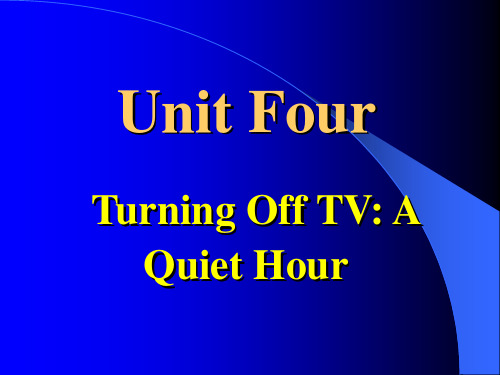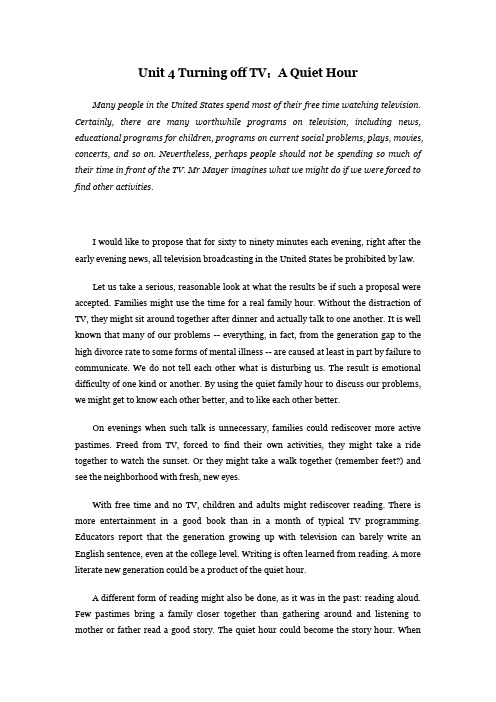turningofftv相关材料
- 格式:pdf
- 大小:2.18 MB
- 文档页数:16


Unit 4 Turning off TV:A Quiet HourMany people in the United States spend most of their free time watching television. Certainly, there are many worthwhile programs on television, including news, educational programs for children, programs on current social problems, plays, movies, concerts, and so on. Nevertheless, perhaps people should not be spending so much of their time in front of the TV. Mr Mayer imagines what we might do if we were forced to find other activities.I would like to propose that for sixty to ninety minutes each evening, right after the early evening news, all television broadcasting in the United States be prohibited by law.Let us take a serious, reasonable look at what the results be if such a proposal were accepted. Families might use the time for a real family hour. Without the distraction of TV, they might sit around together after dinner and actually talk to one another. It is well known that many of our problems -- everything, in fact, from the generation gap to the high divorce rate to some forms of mental illness -- are caused at least in part by failure to communicate. We do not tell each other what is disturbing us. The result is emotional difficulty of one kind or another. By using the quiet family hour to discuss our problems, we might get to know each other better, and to like each other better.On evenings when such talk is unnecessary, families could rediscover more active pastimes. Freed from TV, forced to find their own activities, they might take a ride together to watch the sunset. Or they might take a walk together (remember feet?) and see the neighborhood with fresh, new eyes.With free time and no TV, children and adults might rediscover reading. There is more entertainment in a good book than in a month of typical TV programming. Educators report that the generation growing up with television can barely write an English sentence, even at the college level. Writing is often learned from reading. A more literate new generation could be a product of the quiet hour.A different form of reading might also be done, as it was in the past: reading aloud. Few pastimes bring a family closer together than gathering around and listening to mother or father read a good story. The quiet hour could become the story hour. Whenthe quiet hour ends, the TV networks might even be forced to come up with better shows in order to get us back from our newly discovered activities.At first glance, the idea of an hour without TV seems radical. What will parents do without the electronic baby-sitter? How will we spend the time? But it is not radical at all. It has been only twenty-five years since television came to control American free time. Those of us thirty-five and older can remember childhoods without television, spent partly with radio -- which at least involved the listener's imagination -- but also with reading, learning, talking, playing games, inventing new activities. It wasn't that difficult. Honest. The truth is we had a ball.在美国,许多人把大部分空闲时间花在看电视上。

父母与子女(Parents and Kids)many parents who welcome the idea of turning off tv and spending more time with the family are still worded that without tv they would constantly be on call as entertainers for their children. they remember thinking up all sorts of things to do when they were kids. but their own kids seem different,less resourceful, somewhat.when there's nothing to do,these parents observe regretfully, their kids seem unable to come up with anything to do besides turning on tv.one father, for example, says,"when i was a kid, we were always thinking up things to do. we certainly never complain in an annoying way to our parents: '1 have nothing to do! ' "he compares this with his own children today:"they're simply lazy. if someone doesn't entertain them, they' ii hap-pily sit there watching tv all day."there is one word for this father's disappointment: unfair. he deplores his children' s lack of inventiveness, as if the ability to play were something innate that his children are missing. in fact, while the tendency to play is built into the human species, the actual ability--to imagine, to invent, toelaborate--and the ability to gain fulfillment from it are skills that have to be learned and developed.such disappointment, however, is not only unjust, it is also destructive. sensing their parents' disappointment, children come to believe that they are, indeed, lacking something, and that this makes them less worthy of admiration and respect. giving children the opportunity to develop new re-sources, to enlarge their horizons and discover the pleasures of doing things on their own is, on the other hand, a way to help children developa confident feeling about themselves as capable and interesting people.。


Unit 4 Turning Off TV: A Quiet HourTeaching Time: 4 hoursStudents’ level: freshmen for non-English majorsTeaching Objectives:1. to make the students know the bad effect of watching too much TV on the daily life so as toteach them to cultivate more interests and educational entertainment.2. About the text, Ss should grasp the text content, text structure, basic vocabularies andrequired grammar points of the section.1.About the reading, Ss should acquire the reading skill—using context clues for wordmeanings (PartI, P64).2.About the writing, Ss should get to know the writing skill—using avoiding redundancy(P69).Teaching Procedures:I. Pre-reading Activities1. Background information:The generation gap is one of the most widely discussed and controversial problems of recent years. Some doubt whether such a gap exists. They don’t believe the young generation is set apart from the old generation by a wide gap. Many others, on the other hand, insist a gap between young and the old generation is unavoidable and generation gap today, if anything, is worse than before. The reason they give is that the tremendous explosion of knowledge in the 20 century has made life for young people today so different from life as it was when their parents were young.2. Warm-up activities: Let Ss discuss the advantages and disadvantages of TVII. While-reading Activities1. Ss have the silent reading on the text (10 mins)2. Language points:Vocabulary:1.w orthwhil e: adv. worthy of time, efforts, etc.e.g. Can you recommend me some worthwhile books to read.Worthwhile and worthy can be used as an attributiveWorth 后接名词主动形式表示被动意义。

Turning off TV: a Quiet HourI would like to propose that for sixty to ninety minutes each evening, right after the early evening news, all television broadcasting in the United States be prohibited by law.Let us take a serious, reasonable look at what the results be if such a proposal were accepted. Families might use the time for a real family hour. Without the distraction of TV, they might sit around together after dinner and actually talk to one another. It is well known that many of our problems -- everything, in fact, from the generation gap to the high divorce rate to some forms of mental illness -- are caused at least in part by failure to communicate. We do not tell each other what is disturbing us. The result is emotional difficulty of one kind or another. By using the quiet family hour to discuss our problems, we might get to know each other better, and to like each other better.On evenings when such talk is unnecessary, families could rediscover more active pastimes. Freed from TV, forced to find their own activities, they might take a ride together to watch the sunset. Or they might take a walk together (remember feet?) and see the neighborhood with fresh, new eyes.With free time and no TV, children and adults might rediscover reading. There is more entertainment in a good book than in a month of typical TV programming. Educators report that the generation growing up with television can barely write an English sentence, even at the college level. Writing is often learned from reading. A more literate new generation could be a product of the quiet hour.A different form of reading might also be done, as it was in the past: reading aloud. Few pastimes bring a family closer together than gathering around and listening to mother or father read a good story. The quiet hour could become the story hour. When the quiet hour ends, the TV networks might even be forced to come up with better shows in order to get us back from our newly discovered activities.At first glance, the idea of an hour without TV seems radical. What will parents do without the electronic baby-sitter? How will we spend the time? But it is not radical at all. It has been only twenty-five years since television came to control American free time. Those of us thirty-five and older can remember childhoods without television, spent partly with radio -- which at least involved the listener's imagination -- but also with reading, learning, talking, playing games, inventing new activities. It wasn't that difficult. Honest. The truth is we had a ball.我想建议每天晚上一播完晚间新闻,美国所有的电视台都依法停播六十至九十分钟。